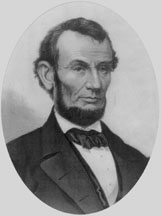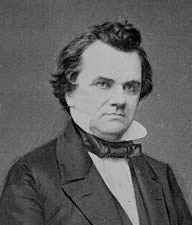This Week in History
October 6-12, 1858
Lincoln Exposes Douglas's Sophistry on the Issue of Slavery
October 2013

Abraham Lincoln |

Stephen Arnold Douglas |
The seven debates between Abraham Lincoln and Sen. Stephen A. Douglas during the U.S. Senate campaign of 1858, known today as the Lincoln-Douglas Debates, dealt overwhelmingly with the effects of the Kansas-Nebraska Act and the Dred Scott Decision. But each debate had a slightly different focus, and the one at Galesburg, Ill. on Oct. 7 was memorable for Lincoln's ability to reveal the inconsistencies in Douglas's arguments, and the intentions behind the constant sophistries which Douglas employed.
Douglas was a slippery orator who would speak for hours, but never directly answer Lincoln's questions. What Lincoln aimed at, was to make both his and the Senator's actual policies crystal clear, even if the Senator would not, so that citizens could easily choose between them. And it was not just the voters of Illinois that Lincoln was talking to. Lincoln's view was that when most Americans saw clearly what the choices were, the looming danger to the nation might be averted.
Senator Douglas always stated that the words in the Declaration of Independence, "All men are created equal," was never intended to apply to the Negro. Douglas claimed that he did not care whether slavery existed or not; it was of no concern to him, and certainly not a moral issue. What he did provide for dealing with this "problem" was what he called "popular sovereignty," the supposed right of a state or territory to regulate slavery as it pleased. Despite the overwhelming evidence contained in the drive to bring slavery to America's new territories, and the national legislation and Supreme Court decisions which presaged making slavery legal in all states, Douglas maintained that a new territory could use "popular sovereignty" to keep out slavery.
He put it this way to the citizens of Galesburg:
"Chief Justice [Roger] Taney has said, in his opinion in the Dred Scott case, that a Negro slave being property, stands on an equal footing with other property, and that the owner may carry them into United States territory the same as he does other property. Suppose any two of you, neighbors, should conclude to go to Kansas, one carrying $100,000 worth of Negro slaves and the other $100,000 worth of mixed merchandise, including quantities of liquors. You both agree that under that decision you may carry your property to Kansas, but when you get it there, the merchant who is possessed of the liquors is met by the Maine liquor law, which prohibits the sale or use of his property, and the owner of the slaves is met by equally unfriendly legislation, which makes his property worthless after he gets it there.
"What is the right to carry your property into the territory worth to either, when unfriendly legislation in the territory renders it worthless after you get it there? The slaveholder when he gets his slaves there finds that there is no local law to protect him in holding them, no slave code, no police regulation maintaining and supporting him in his right, and he discovers at once that the absence of such friendly legislation excludes his property from the territory, just as irresistibly as if there was a positive constitutional prohibition excluding it.
"Thus you find it is with any kind of property in a territory, it depends for its protection on the local and municipal law. If the people of a territory want slavery, they make friendly legislation to introduce it, but if they do not want it, they withhold all protection from it, and then it cannot exist there."
This sanguine view, of course, did not comment on the still-recent events in "Bleeding Kansas," where the pro-slavery Lecompton Constitution had been stuffed down the throats of the anti-slavery settlers.
The firepower for enforcing this decision had been provided by heavy funding to gun-toting, pro-slavery forces imported from Missouri. Less than two months before the Galesburg debate, the majority of Kansas settlers had finally succeeded, despite the murders of Free-State men at Lawrence, in rejecting the pro-slavery constitution and had come into the Union as a free state.
Lincoln avoided the controversy over Kansas, but deftly pointed out the fallacies in Douglas's argument:
"The Judge [Douglas had been an Illinois Supreme Court judge] has alluded to the Declaration of Independence, and insisted that Negroes are not included in that Declaration; and that it is a slander upon the framers of that instrument, to suppose that Negroes were meant therein; and he asked you: Is it possible to believe that Mr. Jefferson, who penned the immortal paper, could have supposed himself applying the language of that instrument to the Negro race, and yet held a portion of that race in slavery? Would he not at once have freed them?
"I only have to remark upon this part of the Judge's speech that I believe the entire records of the world, from the date of the Declaration of Independence up to within three years ago, may be searched in vain for one single affirmation, from one single man, that the Negro was not included in the Declaration of Independence. I think I may defy Judge Douglas to show that he ever said so, that Washington ever said so, that any President ever said so, that any member of Congress ever said so, or that any living man upon the whole Earth ever said so, until the necessities of the present policy of the Democratic Party, in regard to slavery, had to invent that affirmation.
"And I will remind Judge Douglas and this audience, that while Mr. Jefferson was the owner of slaves, as undoubtedly he was, in speaking upon this very subject, he used the strong language that 'he trembled for his country when he remembered that God was just;' and I will offer the highest premium in my power to Judge Douglas if he will show that he, in all his life, ever uttered a sentiment at all akin to that of Jefferson."
Lincoln then dissected Douglas's supposedly amoral view of slavery.
"I suppose that the real difference between Judge Douglas and his friends, and the Republicans on the contrary, is that the Judge is not in favor of making any difference between Slavery and Liberty—that he is in favor of eradicating, of pressing out of view, the questions of preference in this country for Free over Slave institutions; and consequently every sentiment he utters discards the idea that there is any wrong in Slavery. He insists that, upon the score of equality, the owners of slaves and owners of property—of horses and every other sort of property—should be alike and hold them alike in a new Territory."
Lincoln then said that he had asked Douglas at Freeport a question which he had not answered, only contenting "himself with sneering at the thought that it was possible for the Supreme Court ever to make such a decision." Lincoln had asked, "If the Supreme Court of the United States shall decide that the States cannot exclude slavery from their limits, are you in favor of acquiescing in, adhering to and following such decision, as a rule of political action?"
Lincoln then read from the U.S. Constitution, where it states that the Constitution and the laws of the United States made in pursuance of that Constitution, and all treaties, shall be the supreme law of the land, "and the judges in every State shall be bound thereby, anything in the Constitution or laws of any State to the contrary notwithstanding." Then Lincoln read from the Supreme Court's Dred Scott decision, which stated that, "Now, as we have already said in an earlier part of this opinion, upon a different point, the right of property in a slave is distinctly and expressly affirmed in the Constitution."
Said Lincoln,
"I believe that the right of property in a slave is not distinctly and expressly affirmed in the Constitution and Judge Douglas thinks it is. I believe that the Supreme Court and the advocates of that decision may search in vain for the place in the Constitution where the right of property in a slave is distinctly and expressly affirmed. I say, therefore, that I think one of the premises is not true in fact. But it is true with Judge Douglas. It is true with the Supreme Court who pronounced it. It being affirmed in the decision that the right of property in a slave is distinctly and expressly affirmed in the Constitution, the conclusion inevitably follows that no State law or constitution can destroy that right."
Therefore, what value had Douglas's conception of the "popular sovereignty" which would stop slavery from being introduced into an area, if the Supreme Court followed up its statement in the Dred Scott decision with another which enforced slavery as the supreme law of the land? "So far in this controversy," said Lincoln, "I can get no answer at all from Judge Douglas upon these subjects. Not one can I get from him, except that he swells himself up and says, 'All of us who stand by the decision of the Supreme Court are the friends of the Constitution; all you fellows that dare question it in any way, are the enemies of the Constitution.
"Now, in this very devoted adherence to this decision, in opposition to all the great political leaders whom he has recognized as leaders—in opposition to his former self and history, there is something very marked. It marks it in this respect, that it commits him to the next decision, whenever it comes, as being as obligatory as this one, since he does not investigate it, and won't inquire whether this opinion is right or wrong. So he takes the next one without inquiring whether it is right or wrong. He teaches men this doctrine, and in so doing prepares the public mind to take the next decision when it comes, without any inquiry.
"In these general maxims about liberty—in his assertions that he 'don't care whether Slavery is voted up or voted down'; that 'whoever wants Slavery has a right to have it'; that 'upon principles of equality it should be allowed to go everywhere'; that 'there is no inconsistency between free and slave institutions.' In this he is also preparing (whether purposely or not), the way for making the institution of Slavery national! I repeat again, for I wish no misunderstanding, that I do not charge that he means it so; but I call upon your minds to inquire, if you were going to get the best instrument you could, and then set it to work in the most ingenious way, to prepare the public mind for this movement, operating in the free States, where there is now an abhorrence of the institution of Slavery, could you find an instrument so capable of doing it as Judge Douglas? Or one employed in so apt a way to do it?"
The original article was published in the EIR Online’s Electronic Intelligence Weekly, as part of an ongoing series on history, with a special emphasis on American history. We are reprinting and updating these articles now to assist our readers in understanding of the American System of Economy.
